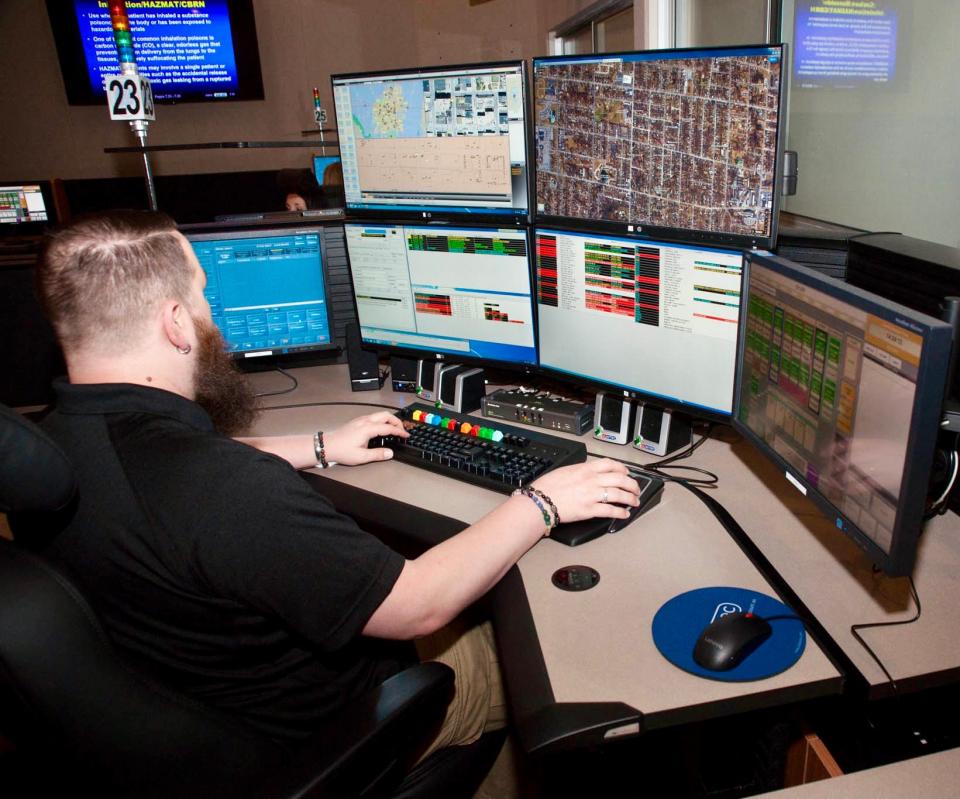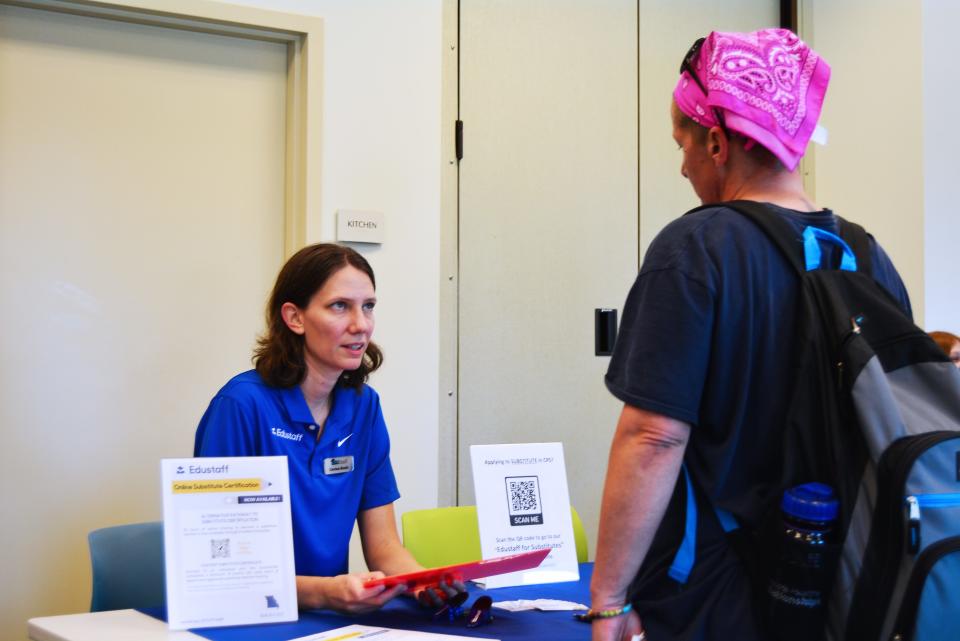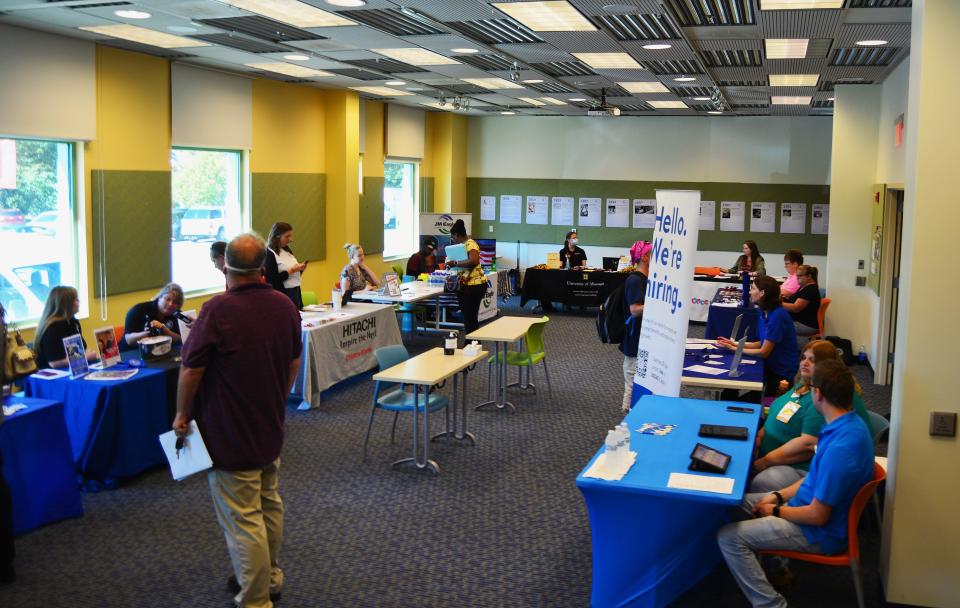Half-staffed Boone County Joint Communications emblematic of more openings than applicants

Boone County Joint Communications continues to feel the strain of open positions.
Representatives from the agency participated in a hiring event this week, along with 10 other employers, hosted by the Columbia Job Center at Daniel Boone Regional Library.
Another job fair event is planned 1-4 p.m. Sept. 22 at Armory Sports and Recreation Center at 701 E. Ash St. in Columbia. This event will feature 22 hiring companies.
The shortage at joint communications has led to a lot of overtime for dispatchers, said representative Stacie Horrell.
"Someone has to be there to answer the phone," Horrell said.
There is a multi-step process to become a dispatcher, including an initial test and interview. Once a person clears that stage, they advance to training classes.
"We don't really have a set number that we hire. We have hired up to 10 people at a time," said representative Cassie Walton. "We had six in the last class."

A full contingent is 61 full-time staff members. Joint communications had 33 full-time staff members as of Wednesday. There are 28 full-time openings.
Even getting one new hire is a success, Horrell said.
There are three shifts, each with up to six dispatchers, including a supervisor.
"I think a lot of people don't know what we do," Horrell said. "We work to get the information out there."
Joint communications covers dispatching for all law enforcement, fire and EMS agencies in the county.
"This is emergency and non-emergency. We are an independent agency," Horrell said.
Employers, job seekers on job market
Missouri Department of Corrections
Another location feeling the weight of needing to hire more employees is the Boonville Correctional Center. It is at roughly 50% capacity with its correctional officers, said Felicia Murphy, senior office support assistant.
Because of the need, the Department of Corrections has changed some of its hiring rules, she added. Correctional officers now can be hired at 18 years old and they are no longer required to have a driver's license.
Hiring shortages and employment demand can depend on a facility's location, Murphy said. Some have more applicants than positions, while others may have many openings, but a dearth of applicants.
Job seekers
Among job seekers was D.J. White, who was interested in a job with the Department of Corrections or in the health care field.
"I'm looking for a career, not just a short-term job," he said. "I have had a long-term dream of trying my hand at law enforcement, and I think the Department of Corrections could be a good first step.
"I have a lot of experience across a lot of industries, so I can do a little bit of everything."
Melissa Robertson, another job seeker, heard about the walk-in opportunity at the Salvation Army Harbor House.
"I am open to any. I think I could do any. I just need to sit down and decide which I feel like would be the most rewarding and best fit," she said. "I'm leaning toward the Boone County or City of Columbia (openings)."
EduStaff

EduStaff, which provides substitute teachers to Columbia Public Schools, knows there is a high need and will continue to fill the need, said representative Carissa Keedy. Substitute requirements have changed. Now a person needs only 36 college credit hours to be a substitute, instead of 60.
Those who do not have 36 credit hours can take a course to get substitute certification, Keedy said.
"We are trying to make sure people are aware of (the class) and let them know even if they do not think they are eligible, there are options," she said.
There also are roles in schools that do not require substitute certification that EduStaff can fill, Keedy said.
"Once subs get approved and onboarded, they start to find more of their individual fit at the schools," she said. "We are looking for people who are passionate and interested, and we will help them be successful.
"We have an orientation workshop where we train subs before they step into a classroom."
Hitachi Energy (ABB)
One employer at the walk-in event Wednesday with both skilled and on-the-job training positions was Hitachi Energy (ABB) of Jefferson City.
"Our company is expanding, so we definitely are looking to add about 100 jobs to our facility this year," said representative Ashley Allen. "We are looking for people who are looking for a really good company to work for."
When it comes to whether to make a career change, the big factor for people is competitive wages, she said. The Jefferson City plant generally has 55 job titles. Many will receive on-the-job training.
There are some more skilled positions, such as welder, electrical tester or mechanic technician. Those positions typically need previous experience or some sort of degree or certification.
Those with previous manufacturing experience could receive a sign-on bonus, Allen said.
Hitachi also connects with vocational schools, such as State Technical College, to find potential employees.
Job fair attendance

The Columbia Job Center had a goal of having 50 guests to its Walk-in Wednesday event this past week. It nearly reached it with 46.
This is higher than average, though, wrote Sundi Jo Graham, communications coordinator and reentry program manager with Central Workforce Development Region, in a follow-up email.
The Columbia job fairs tend to have 30 attendees. Attendance generally is lower than expected, Graham wrote.
Job fair events also are held in Lebanon, Rolla and Jefferson City.
Attendance at the Lebanon events is largely dependent on the positions and employers available. At two of four recent events, there were specialized positions and one company that was 50 miles away, so it had lower attendance, Graham wrote.
Another fair for a local retailer had a lot of interest, she added.
"Attendance at the (Lebanon) job fairs has been as few as one applicant to as many as 40," she wrote.
Rolla had its first job fair event for the year Thursday. There were 30 employers and 76 attendees.
Jefferson City job fairs tend to average 15 to 20 job seekers with nine employers.
The future job market
A presentation last week at Regional Economic Development Inc. from the Missouri Department of Higher Education and Workforce Development laid out the job market in Boone County, along with the central Missouri region.
Around 35,000 people travel into Boone County for their job, while nearly 19,000 residents have jobs in neighboring counties. A majority of people, however, live and work in Boone County — nearly 53,000. This was using 2019 census data.
Slightly more than half of Boone County employees had a less-than-10-mile commute to work. Around 20,000 people had more-than-50-mile commutes in or out of the county, with a majority of those coming or going east or west.
Jobs with high demand now and likely to have 20% growth in 10 years' time in the central Missouri region include restaurant wait staff; bartenders; restaurant hosting staff; drivers and sales workers; and dishwashers, for entry-level jobs. This is based on Missouri Economic Research and Information Center data.
Jobs where some previous skill or even an associate degree likely will still have high demand and growth include restaurant cooks; food preparation supervisors; loan interviewers and clerks; welders; and medical assistants.
At least 20% growth of jobs that require a bachelor's degree or higher is expected in software development; loan officers; management analysts; market research analysts; securities and commodities; medical and health services managers; and financial managers.
Job postings over the past year in Boone County that have seen the most listings have included software development; postsecondary teachers; managers; registered and licensed practical nurses; computer occupations; clinical lab technicians, data scientists; and restaurant cooks, based on information pulled from Lightcast.
Software skills was a big focus of job ads, with some of the most frequent instances over the past year in Boone County relating to Tableau, a business intelligence software; Java, a programming language; Linux; Amazon Web Services; and Microsoft Azure, among others.
Charles Dunlap covers local government, community stories and other general subjects for the Tribune. You can reach him at cdunlap@columbiatribune.com or @CD_CDT on Twitter. Please consider subscribing to support vital local journalism.
This article originally appeared on Columbia Daily Tribune: Half-staffed Columbia dispatchers emblematic of labor challenges

